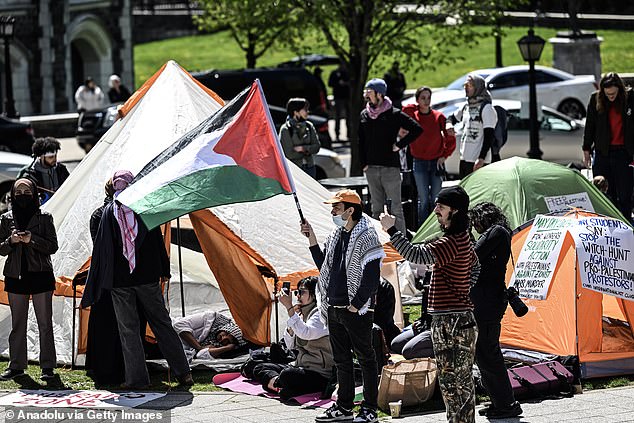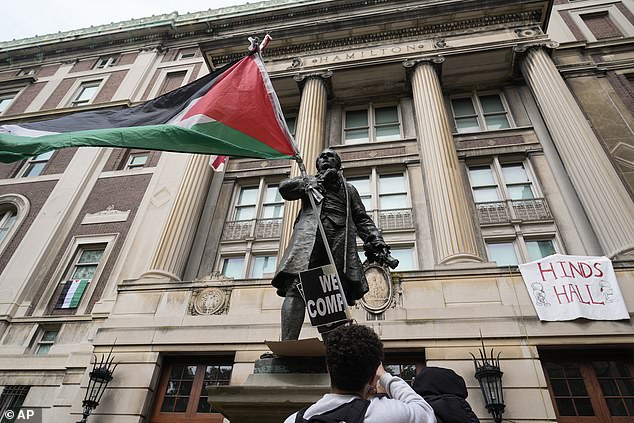Columbia University president Minouche Shafik resigns after outrage over anti-Israel protests on campus
The president of Columbia University has resigned effective immediately, just a week after three of her deans resigned over a leaked text message ridiculing concerns about anti-Semitism.
Minouche Shafik resisted demands to resign when the New York university was shut down earlier this year due to anti-Israel protests, but said on Wednesday that the “unrest” had “taken a significant toll on my family.”
Donations began to dry up as wealthy benefactors reacted with horror to the protests. Shafik herself was widely criticized when she appeared before Congress, where she refused to say whether the statement “From the river to the sea, Palestine will be free” was anti-Semitic.
But she angered students when she called on the NYPD to clear the campus of protesters and refused to accede to their demands to take university money from Israel.
“It is painful for the community, for me as president and on a personal level, that I, my colleagues and the students are the target of threats and abuse,” she said last night.
Columbia University President Minouche Shafik blamed the significant toll my family had to pay on her decision to resign effective immediately

The university’s New York campus was one of dozens of campuses across the country hit by anti-Israel protests earlier this year
The texting occurred during a May gathering at the Ivy League school, where Jewish students described the anti-Semitism they experienced on campus following Hamas’s brutal Oct. 7 attack on Israel.
The trio were suspended, according to a letter from Shafik and university dean Angela Olinto sent to members of the school community after the texts emerged in June.
The three in question are former associate dean for student and family support Matthew Patashnick, vice dean and chief administrative officer Susan Chang-Kim, and former dean of undergraduate student life Cristen Kromm.
The event was titled Jewish Life on Campus: Past, Present and Future and took place on May 31.
The text messages, which have since been made public, include Chang-Kim saying: “Coming from such a privileged position… hard to hear I’m sorry, we need to meet at Kraft center. Huh??”
Kromm responds, “Amazing what $$ can do,” as he refers to an op-ed published in the school’s Columbia Spectator newspaper.
The reports were later released as part of an investigation by the House Committee on Education and Labor.
Columbia College Dean Josef Sorett was also involved in the text discussion, but took a less active part.
“This incident revealed behavior and sentiments that were not only unprofessional but also disturbingly aligned with long-standing anti-Semitic elements,” Shafik told the school community.
“Whether or not this was intended, these sentiments are unacceptable and deeply troubling. They demonstrate a lack of seriousness about the concerns and experiences of members of our Jewish community. This is contrary to the values of our university and the standards we must uphold in our community.”

The surfacing of the texts sparked fresh outrage on campus, which has been rocked for months by anti-Israel protests in the wake of the war with Hamas.




Portions of the text messages released by the three deans to Congress last week
Egyptian-born Shafik was the first woman to be president of Colombia and is returning to the UK, where she is a member of the House of Lords.
At 36, she became the youngest ever vice president of the World Bank. It was while working there that she met her first husband, fellow countryman Mohamed El-Erian.
In 2002, Shafik married her second husband, scientist Raffael Jovine. The couple have two children and three stepchildren.
Their daughter, Olivia, graduated from Columbia’s city planning department in 2015.
“I have tried to walk a path that upholds academic principles and treats everyone with fairness and compassion,” she wrote in her resignation statement on Wednesday.
As President Lincoln said, “A house divided cannot stand.” We must do everything we can to resist the polarizing forces in our community.
‘I remain optimistic that differences can be overcome through an honest exchange of views, by truly listening and by always treating each other with dignity and respect.’
